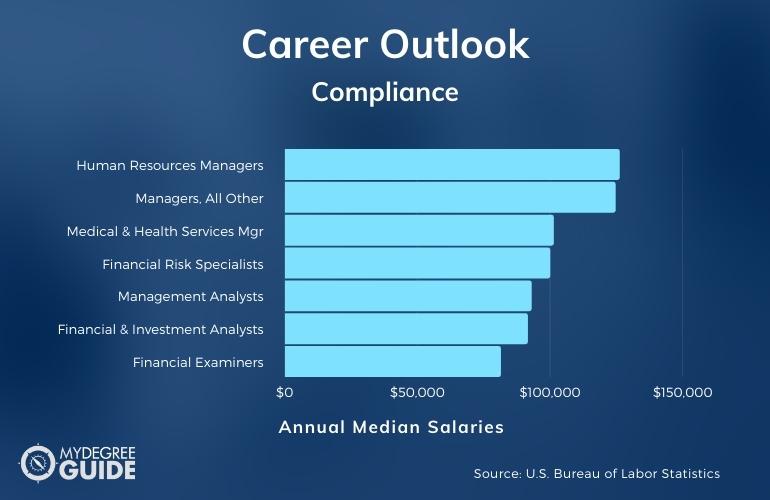An online masters in compliance can help you develop ethical sensitivity, legal knowledge, and risk management skills.

Organizations in all industries must comply with increasingly complex government regulations and ethical guidelines. Compliance officials ensure that corporations and other institutions obey all applicable laws, professional standards, and rules. Individuals in this field may work in-house for a corporation or find employment with a regulatory agency.
Editorial Listing ShortCode:
A masters in compliance could be a strategic choice if you’re interested in advising organizations, developing ways to help your employer mitigate risk, and staying up to date on the latest laws.
Online Masters in Compliance Programs

Organizations must follow an ever-growing body of regulations created by government agencies and professional associations. Failure to follow these rules can have significant consequences, including criminal charges, damaged reputations, and financial penalties.
Compliance professionals help organizations obey regulations and requirements. Typical responsibilities include advising decision-makers, developing compliance training programs, and updating corporate policies to follow new rules.
Editorial Listing ShortCode:
A masters degree in compliance can help prepare you for a rewarding career in this field. This interdisciplinary discipline blends principles and theories from multiple areas, including business, communication, law, philosophy, and risk management.
You can study subjects like:
- Anti-money laundering regulations
- Crisis management
- Business ethics
- Curriculum design
- Health care compliance
- Procedural law
- Public safety
- Risk assessment
Depending on your qualifications, you can pursue one of several types of compliance masters degrees:
- Juris Master (JM) in Compliance: This master’s degree focuses closely on the legal side of compliance, providing a thorough overview of legal issues and systems. A JM can be a strategic choice for people who don’t have a Juris Doctor (JD) but want to gain an in-depth understanding of compliance laws.
- Master of Laws (LLM) in Compliance: This degree allows practicing attorneys who have already completed a JD to specialize in a particular area of compliance and risk management, like healthcare regulation.
- Master of Studies in Law (MSL) in Compliance: The MSL allows nonlawyers to gain legal expertise and pursue professional careers in compliance. Functionally, the JM and MSL are very similar.
Ethical standards and legal standards constantly evolve. There is a high demand for compliance professionals who can help organizations keep up with these changes.
A master in compliance and risk management can help prepare you for many different career paths. For instance, some professionals work as:
- Accreditation manager
- Compliance coding specialist
- Compliance manager
- Compliance officer
- Corporate internal auditor
- Environmental health and safety director
- Patient safety program manager
- Risk manager
As with a masters in negotiation online, by completing a master’s in compliance online, you can develop advanced legal knowledge that may help you enter or advance in this fast-paced field.
Common Online Master in Compliance Degree Specializations

Many compliance graduate programs allow you to tailor your studies by pursuing a specialization. Common specializations include:
- Corporate Compliance. You can prepare for a leadership role in corporations by learning about business fundamentals, internal policies, and government regulations. You can also develop management and employee training skills.
- Data and Cybersecurity Compliance. This specialization focuses on cybersecurity and data regulations. You can learn about strategies and tools that will help protect your organization from data breaches, fraud, and other cybercrimes.
- Employment Law. This concentration focuses on ethics and laws related to employment and human resources, such as hiring, firing, and workplace discrimination.
- Financial Compliance. This concentration teaches you ways to detect fraud, prevent identity theft, and protect consumers and investors from financial crimes.
- Healthcare Compliance. You can learn about government regulations, internal rules, and professional ethics in the healthcare industry. Topics may include patient privacy and pharmaceutical laws. This specialization helps prepare you for careers in hospitals, pharmaceutical companies, and other healthcare settings.
If you have a particular career path or industry in mind, selecting a compliance masters program with a relevant specialization can be strategic in helping you qualify for your preferred position.
Compliance Careers & Salaries

A master in compliance and risk management is a versatile degree that can help prepare you for various careers. Since most public and private organizations need compliance experts, you may find employment in many industries, including:
- Education
- Finance
- Healthcare
- Human resources
- Manufacturing
- Mining
- Oil and gas
- Telecommunications
- Transportation
Your legal and management expertise might also help you obtain a position in a federal, state, or local government agency. Some compliance professionals work as freelance consultants.
According to the Bureau of Labor Statistics, here are some career paths related to compliance and risk management.
| Careers | Annual Median Salaries |
| Human Resources Managers | $126,230 |
| Managers, All Other (Including Compliance) | $124,650 |
| Medical and Health Services Managers | $101,340 |
| Financial Risk Specialists | $100,000 |
| Management Analysts | $93,000 |
| Financial and Investment Analysts | $91,580 |
| Financial Examiners | $81,410 |
| Labor Relations Specialists | $77,010 |
| Compliance Officers | $71,650 |
| Compensation, Benefits, and Job Analysis Specialists | $64,120 |
The Bureau of Labor Statistics predicts that many of these careers will experience average or faster than average employment growth over the next ten years.
Your eligibility for specific positions and your potential salary can depend on many factors, including your education, location, skills, and years of work experience. Career opportunities and wages can also vary among industries.
Editorial Listing ShortCode:
You may boost your chances of landing a preferred position by choosing an online master’s in compliance program that allows you to specialize in your area of interest. As it is with most programs leading to on-campus or online business management degrees, completing capstone projects, internships, and networking opportunities may also give you a leg up in your job search.
Compliance Master Curriculum & Courses

When you enroll in a master’s in compliance program, you can take various courses that allow you to develop advanced knowledge of business practices, legal concepts, and risk mitigation strategies. You can also gain industry-specific knowledge in specialized classes.
No two programs will offer identical curricula, but you may be required to take graduate courses similar to these:
- Consumer Compliance: You’ll study federal and state regulations governing consumer financial services and learn about compliance policies in financial institutions.
- Corporate Deviance: You’ll analyze recent corporate deviance cases and research the legal and societal consequences that businesses face for noncompliance.
- Cyber Crime and Computer Law: You’ll learn how to detect, prevent, and prosecute different kinds of cybercrime.
- Ethics and Professional Responsibility: This course provides an overview of ethical dilemmas that lawyers and other compliance professionals may face, and it teaches professional strategies to address these challenges.
- Foundations of Law: In this introductory course, you’ll learn basic legal concepts related to corporate compliance and liability, such as criminal law, sales, and torts.
- Healthcare Compliance: You’ll learn about compliance issues, ethical and legal standards, and internal reporting processes in the healthcare industry.
- Introduction to Legal Analysis and Writing: You’ll develop strong communication, critical analysis, and research skills for legal writing.
- The Regulatory Process: You’ll gain a deep understanding of industry-specific regulations, legislative processes, and regulatory agency operations.
- Risk Management and Auditing: This class teaches you practical processes and technical tools that you can use to conduct corporate audits, perform risk assessments, and respond to external investigations.
- Securities Law and Compliance: This course examines federal securities laws and explores compliance and liability issues related to these regulations.
A diverse selection of courses can help you become a well-rounded expert in compliance, communications, law, and other relevant areas.
Admissions Requirements

Admissions requirements can vary between schools, but many compliance graduate programs request similar application materials. Typical admissions requirements include:
- GRE or GMAT scores (only some schools require them)
- Professional resume
- Personal statement describing your qualifications and interest in compliance
- Letters of recommendation from faculty or work supervisors
- Transcripts from all previously attended institutions
Some programs, especially LLM programs, exclusively accept students who have completed a JD. Other programs may only require a bachelor’s degree in a relevant discipline, like accounting, communications, English, or finance.
Accreditation

Like corporations and financial institutions, colleges and universities also face scrutiny from external regulatory agencies. Regional accreditation verifies that educational institutions have complied with quality standards and rules developed by regional accrediting organizations.
Receiving an online master’s in compliance from an accredited institution has several advantages. For instance, many employers prefer to hire job candidates who have received degrees from accredited schools. Most universities will also not accept transfer credits from unaccredited schools, which could impact your ability to pursue other degrees in the future.
Editorial Listing ShortCode:
You can visit the website of the Council for Higher Education Accreditation (CHEA) to verify a school’s accreditation status.
Financial Aid and Scholarships

If you’re concerned about paying for tuition and graduate school fees, you may be able to reduce your upfront costs if you qualify for financial aid opportunities and scholarships.
If you plan to work during your studies, your employer may offer educational grants or fellowships. You may also qualify for industry-specific scholarships from professional organizations and other associations. Many graduate students qualify for federal student loans. You may also be eligible for state aid.
You could also apply for federal work-study opportunities that can help you find employment during your studies. The Federal Student Aid website can help you learn about these opportunities and determine your eligibility.
Who Should Consider a Master’s Degree in Compliance?

A master’s degree can be a strategic choice for people who want to launch or advance a career in compliance and risk management.
If you already hold a JD, a master’s degree in compliance can let you develop specialized legal knowledge in a particular industry, like finance or healthcare. This credential can also open new career paths beyond working as an attorney.
A master’s degree can also benefit nonlawyers who want to work in the legal field without obtaining a JD. You can develop legislative expertise and learn technical skills that may qualify you for many different careers.
What Can I Do with a Masters in Compliance?

A masters in compliance can help you pursue employment in a variety of industries and roles. Some compliance professionals work directly with corporations, healthcare facilities, financial institutions, and nonprofit organizations. These in-house positions can allow you to assume leadership roles, detect and resolve compliance issues, and train employees.
Your compliance and risk management expertise may also qualify you for careers in the government or other regulatory agencies. You could also launch your own compliance consulting company or law firm. If you prefer to work independently, you may choose to advise or evaluate organizations as a freelancer.
How Long Does It Take to Get a Compliance Masters Degree Online?

The length of time it takes to finish a compliance masters degree depends on a few personal and program-related factors. As with risk management degree online or on-campus programs, many compliance masters programs require you to take 30 to 32 hours of coursework to complete your degree.
If you take classes full-time, you can typically finish the program in 1 year over 3 semesters, which includes fall, spring, and summer terms. If you take classes part-time, it may take you 2 or 3 years to finish your degree. A program that requires a capstone project or an internship may also take an extra semester to finish.
Is a Master’s Degree in Compliance Worth It?

Yes, a master’s degree in compliance is worth it for many students. Laws and regulations change rapidly, and organizations can face serious criminal, financial, and social consequences if they don’t comply. The demand for knowledgeable compliance professionals will likely remain high.
Editorial Listing ShortCode:
In fact, the Bureau of Labor Statistics predicts that many compliance-related jobs will have faster than average job growth over the next decade. For instance, financial risk specialists are expected to see 8% job growth, and the demand for compliance officers is projected to grow by 4%.
Universities Offering Online Masters in Compliance Degree Programs
Methodology: The following school list is in alphabetical order. To be included, a college or university must be regionally accredited and offer degree programs online or in a hybrid format.

Arizona State University offers an online program for a Master of Legal Studies with an emphasis in Corporate and Healthcare Compliance. The program consists of 10 classes that are each 7.5 weeks long. The curriculum consists of courses such as US Law and Legal Analysis, Fundamentals of Contract Law, and Conducting Fact Investigators and Reporting.
Arizona State University is accredited by the Higher Learning Commission.

Cambridge College offers an online program for a Master’s in Business Ethics and Compliance. The curriculum consists of courses such as International Business Ethics, Compliance Cases, and Enterprise Risk Management. The program culminates with a capstone. Prospective students are expected to have at least four years of prior work experience.
Cambridge College is accredited by the New England Commission of Higher Education.

Drake University’s Master of Jurisprudence in Compliance and Risk Management is available 100% online. The program requires the completion of 24 credit hours, which can typically be completed in about 1.5 years. Each course is 6 weeks long, and they have no set login times or scheduled class meetings.
Drake University is accredited by the Higher Learning Commission.

Fordham University’s Master of Studies in Law in Corporate Compliance is available entirely online and designed for working professionals. Classes meet in the morning or evenings, and students can potentially graduate in just 1 year. The program offers tracks in General Compliance, Human Resources, Health Care, and Financial Services.
Fordham University is accredited by the Higher Learning Commission.

Liberty University offers a Juris Master in Compliance that can be earned 100% online. The program requires the completion 30 credit hours, which can typically be done in 1 year. Each class is 8 weeks long. All courses are taught from a Christian worldview. The curriculum consists of courses like Administrative Law, Corporate Compliance Survey, and Ethics and Professional Responsibility.
Liberty University is accredited by the Southern Association of Colleges and Schools Commission on Colleges.

Loyola University—Chicago offers an online program for a Master of Jurisprudence in Compliance and Enterprise Risk Management. New students can start in the fall, spring, or summer. The program can typically be completed in 2 years. The curriculum consists of courses such as Introduction to Legal Study and Legal Writing, Business Organizations, and Introduction to Legal Research.
Loyola University – Chicago is accredited by the Higher Learning Commission.

Northwestern University’s Master of Science in Regulatory Compliance program provides an interdisciplinary curriculum. This fully online, part-time program is designed to be convenient for working adults and gives students the opportunity to choose between completing a thesis or a capstone project. Tracks within the program include Healthcare Compliance, Quality Systems, and Clinical Research.
Northwestern University is accredited by the Higher Learning Commission.

Regent University offers a Master of Arts in Law—Regulatory Compliance. To graduate, students must complete 32 credit hours. The curriculum consists of courses such as Immigration Law and Procedure, Regulatory Compliance Law, Health Care Law, and Employment Discrimination. All courses are fully online and taught from a biblical perspective.
Regent University is accredited by the Southern Association of Colleges and Schools Commission on Colleges.

Seattle University’s Master of Legal Studies in Compliance and Risk Management can be earned fully online. Concentrations are available in Data and Cybersecurity Compliance, Financial Compliance, Corporate Compliance, and Healthcare Compliance. Students can start this part-time program in the fall or the spring and typically finish within 2 years.
Seattle University is accredited by the Northwest Commission on Colleges and Universities.

Seton Hall University offers an MLS in Financial Services Compliance. All required courses are online and are intended to be taken one at a time in 8 week blocks. The program offers concentrations in Intellectual Property Law, Health and Hospital Law, Pharmaceutical and Medical Device Law and Compliance, and Privacy Law.
Seton Hall University is accredited by the Middle States Commission on Higher Education.
Getting Your Masters in Compliance Online

Pursuing an online masters in compliance can help you enhance your communication skills, critical thinking abilities, and legal knowledge. This degree can complement a JD or help nonlawyers qualify for fulfilling legal careers. Because compliance is such a broad field, a master’s degree can allow you to pursue diverse career opportunities.
You can take a deep dive into your preferred industry, like healthcare regulation, or focus on developing a general but thorough understanding of compliance and risk management.
If a compliance master’s degree sounds right for you, you can start this next step in your educational journey today by exploring accredited universities.

